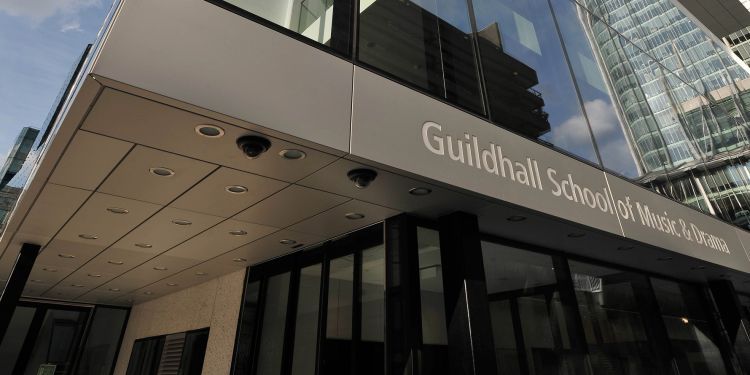Breadcrumb navigation
International research team at Guildhall School of Music & Drama launches major survey amongst musicians working in socially engaged contexts

New project examines the growing number of participatory music-making activities being offered to groups around the world.
Today, 20 October, Guildhall School of Music & Drama, along with partners in three other countries, launches a new multi-country research survey aimed at musicians who work, or have recently worked, in socially engaged settings as part of a three-year investigation into the social impact of music making entitled ‘Music for Social Impact: practitioners’ contexts, work, and beliefs.’
The project, which began earlier this year, examines the growing number of participatory music-making activities being offered to groups around the world, defined by factors such as their social needs or deprivation.
Recognising that much of this activity has been disrupted by COVID-19, participants should feel free to answer the survey based on any relevant experience in the last 5 years. The research aims to provide insights for the following which are vital for rebuilding in the new landscape created by the global pandemic:
- Training – how to support the development of resilient but reflective practitioners
- Commissioning and funding – how to support monitoring and evaluation which allows for, and learns from, experimentation and failure
- Creative development of best practice – through enhanced opportunities and frameworks for interprofessional knowledge exchange
The project is led by Guildhall School Research Professor John Sloboda OBE, in partnership with co-investigators in the UK, Belgium, Columbia and Finland, and is funded by the Arts and Humanities Research Council together with the International Platform for Social Impact of Making Music.
Co-investigators are:
- Professor Heidi Westerlund (Sibelius Academy, University of Arts Helsinki)
- Professor Geoffrey Baker (Royal Holloway, University of London)
- Dr An De Bisschop (University College Ghent)
- Dr Gloria Patricia Zapata Restrepo (Fundación Universitaria Juan N Corpas, Bogota)
Preliminary scoping of the field from public domain information in the four target countries has revealed a common emphasis on work with children and young people and a prioritisation of inclusivity and access. Musical forms and activities which celebrate ethnic minorities and marginalised groups - or aim to provide participants with spaces for inter-cultural encounters - are also an important part of the landscape. There are significant differences of emphasis too. For instance, the elderly and disabled are the focus of much European work, while Colombia has more projects addressing post-conflict reconstruction after their long decades of internal conflict (The full report of the scoping study is available to download).
The project now aims to go deeper and connect directly with musicians who have worked in this area “at the coal face” on a regular basis, so that their experiences and insights can more fully inform the wider community of practice, of commissioning and funding, and particularly of training.
All members of the research team work in arts higher education, where it has become a priority to understand how best to develop the curriculum to support the professional development of resilient but reflective socially engaged artists.
Professor John Sloboda, project leader, said, ‘This is a uniquely challenging time for musicians all over the world. We really want to hear and amplify the voices of working musicians, mostly freelance, whose skills and energies make this delicate and often challenging work flourish. Socially engaged arts work is an increasingly prominent part of the cultural landscape. Distilling and sharing the insights of those who practice is a vital part of ensuring its future flourishing’.
The survey is based online and takes around 30 minutes to complete. Musicians who are based in the following countries and are interested in taking part should consult:
- UK call for participants
- Belgium call for participants
- Colombia call for participants
- Finland call for participants
Guildhall School of Music & Drama is provided by the City of London Corporation.
For further press information please contact:
Rebecca Driver Media Relations
Tel: 07425 151 458
Email: ruth@rdmr.co.uk
Web: www.rdmr.co.uk
Notes to editors
About the AHRC
The Arts and Humanities Research Council is part of UK Research and Innovation. We’re the UK’s largest funder of arts and humanities research and training, investing over £100 million every year. We fund independent researchers in a wide range of subjects, including history, archaeology, digital content, philosophy, languages, design, heritage, area studies, the creative and performing arts, and many more. The research we fund provides social and cultural and benefits that contribute to the economic success of the UK, as well as to the culture and welfare of societies around the world. Find out more about us at ahrc.ukri.org, or on Twitter at @ahrcpress.
About Guildhall School of Music & Drama
Guildhall School is a vibrant, international community of young musicians, actors and production artists in the heart of the City of London. Ranked as one of the top ten performing arts institutions in the world (QA World University Rankings 2020) and highest UK conservatoire in the 2021 Guardian University Guide music and drama league tables, the School is a global leader of creative and professional practice which promotes innovation, experiment and research, with over 1,000 students in higher education, drawn from nearly 60 countries around the world. The School is also the UK’s leading provider of specialist music training at the under-18 level with nearly 2,500 students in Junior Guildhall and the Centre for Young Musicians as well as a joint Creative Learning division with the Barbican which seeks to create inspiring arts experiences for all.
Research at Guildhall explores fundamental questions about the performing arts. As an emerging research environment, research is embraced across music and drama with both staff and doctoral research projects investigating music composition and performance, music therapy and community music, historical musicology, theatre and production arts and the policies and practices of cultural institutions and arts training. Research outputs include books, scores, critical editions, journal articles, performances, and recordings. The doctoral programme boasts around 50 students, some benefiting from studentships offered in collaboration with major arts and research organisations, including the Barbican Centre and the Social Impact in Making Music research platform. The Royal Opera House studentship has led to the development of ground-breaking new operas, compositions and performances such as Philip Venables’ award-winning 4.48 Psychosis and Na’ama Zisser’s Mamzer Bastard.





